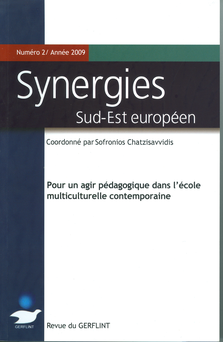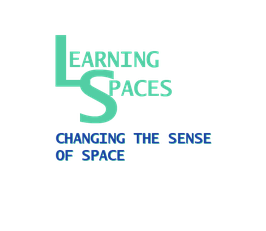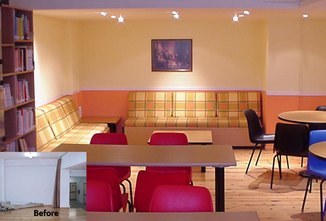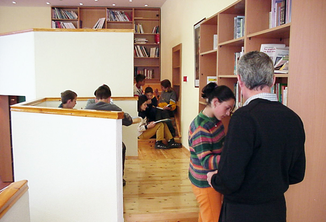Applied Research
Modify THE RELATIONSHIP TO SPACE to CHANGE THE SENSE OF SPACE
Applications on school space, Method, Publications
Applied research by Dimitris Germanos concerns the study of the child's space as a component of the design of learning spaces and school buildings
It aims to remove the stereotypical elements of the spatial framework that impede the creative development of the learning process and make the child's space the material framework for the functioning of the school.
In the field, it is applied by an architectural and pedagogical approach of the design that it has elaborated, the method of "Pedagogical and Architectural Space Design" (The PASD Method).
His research path led him to propose four new types of experimental school space:
- The Multipurpose Classroom,
- the Educational and Cultural School Centers,
- the Open Educational and Cultural Spaces,
- the Educational and Spontaneous Places in school.
Their architectural and educational features are adapted to the pedagogical characteristics of the cooperative class and, at the same time, they aim to promote the child's overall development -academic, psychological and socio-cultural.
This page presents three aspects of his research: the design of learning spaces, the methodological approach and the publications.
the design of learning spaces
CREATION OF FOUR TYPES OF SCHOOL SPACE, WHICH PROMOTE EDUCATIONAL INNOVATION
MULTIPURPOSE CLASSROOMS*
Architectural design is associated with a pedagogical and psycho-social approach.
The main objective of this design approach is to create spaces that contribute to the implementation of modes of communication and interaction related to the application of cooperative education.
*The photos marked by * show spaces created with the DPE method as part of Dimitri Germanos' architectural and educational design projects.
Outdoor EDUCATIonal And CULTURaL Spaces*
In Outdoor Classroom we encounter many flexible micro-environments, such as small spaces that can function alternatively in many different ways:
- Spaces that aim to improve the relationship between school and city, as well as contact between different age groups
- Flexible running school classes
- Outdoor Classes
These spaces are alternatively used for academic and cultural learning activities, as well as for the emotional, social and physical development of children and adolescents.
School Space Comprising Places Created by Children**
The place is a real space, redefined by the subject and loaded with meanings relating to his needs and his imagination.
It can be created spontaneously by the children, if they have the freedom to intervene to the space during the class. But, its creation can also be planned by both, the architect and the teacher, and integrated into the functioning of the classroom.
In our research, the integration of educational spaces in the classroom has revealed to us a new innovative spatial model, according to which class space is defined following the successive rearrangements resulting from its use.
the MEthodological approach
THE THEORETICAL BASIS: The Human-CENTrIc APPROACH TO Physical SPACE**
APPLICATION IN Architectural DESIGN: THE "U"(USER) APPROACH**
**The photos presented above are taken during research-action projects led by Dimitri Germanos; these projects concern the "child-space" relationship and the creation of places at school by children.
THE TOOL FOR THE DESIGN OF LEARNING SPACES:
THE METHOD OF PEDAGOGICAL AND ARCHITECTURAL SPACE DESIGN (PASD)
The research path of Dimitris Germanos, based on the evaluation of the pedagogical and architectural redesign projects that he carried out with the "U" Approach, led him to the elaboration of the method of "Pedagogical and Architectural Space Design".
The PASD method is an architectural design approach based on a framework of pedagogical, psychosocial and architectural criteria, which aims to make the child's space the material framework for the educational functioning of the modern school.
Portfolio : Before and after the change of school space with the PASD method.
Publications
Most publications of Dimitris Germanos are based on proprietary research, whereby he provides an evaluation of his applied work. His publications can be classified in three main categories:
- The Pedagogical and Architectural Space Design (application of the PASD Method)
- Space as a tool for children to learn and socialize
- The importance of architectural space design for the educational change.
Follow above some of his main publications.
Tsoukala, K., Germanos, D. (eds) (2020). Children spatial narration. City, play, education. Thessaloniki: Epikentro Editions .

With the collaboration of the researchers: Gkloumpou, A., Katsavounidou, A., Panteliadou, G., Tombrou, P.
URL Adress:
Keywords : child's space; school space; spatial transformation; space and educational change; urban space for children; play's spaces.
Language : GR
Gkloumpou, A., Germanos, D. (2020). The importance of classroom cooperative learning space as an immediate environment for educational success. An action research study in Greek Kindergartens

Educational Action Research, DOI: 10.1080/09650792.2020.1771744
Article URL:
https://www.tandfonline.com/doi/full/10.1080/09650792.2020.1771744
Keywords: Classroom space, places, group, educational process, kindergarten.
Language: EN
Germanos, D. (2019). Creating the child's space at school: The "U" approach and the Pedagogical Space Design.
Germanos, D. (2015). The place as factor of the pedagogical quality of space.

In : Tsoukala, K., Germanos, D. (ed.) (2019). Spaces for the child or spaces of the child? Interdisciplinary Congress Proceedings with International Participation held in Thessaloniki on May 19-21, 2017. Athens : Hellenic National Documentation Center, 40-59.
Congress Proceedings:
https://eproceedings.epublishing.ekt.gr/index.php/childspace/article/view/1427
Keywords: User approach; school space; spatial flexibility; place; Pedagogical and Architectural Space Design. Language: GR
Germanos, D., Gkloumpou, A. (2019). The child creates his own space: architectural, educational and psychosocial factors.

In: Tsoukala, K., Germanos, D. (ed.) Children’s Spaces or Spaces for Children? Interdisciplinary Congress Proceedings with International Participation,Thessaloniki, 19-21/5/2017. Athens : Hellenic National Documentation Center1, 135-151.
Congress Proceedings:
https://eproceedings.epublishing.ekt.gr/index.php/childspace/article/view/1431
Keywords: Space of the child; school space; architectural and educational design of space; educational change Language: GR.
Germanos, D. (2009). The educational redesign of school space, a means of transition from the traditional classroom to a multicultural cooperative class.

GERFLINT. Paris: Synergies/ Sud-Est Européen, 2, 85-101.
https://gerflint.fr/Base/SE_europeen2/germanos.pdf
Keywords: Child-space relationship, educational redesign of space, multicultural class, cooperative education, kindergarten.
Language: FR

In: Germanos, D, Liapi, M. (eds.) (2015). Places for Learning Experiences. Think, Make, Change. Digital Proceedings of the Symposium with International Participation held in Thessaloniki, Greece, on January,09-10, 2015. Athens: Greek National Documentation Centre, 46-55.
Congress Proceedings :
http://epublishing.ekt.gr/en/12240
Keywords: Educational place, child oriented design, school space, space flexibility, educational process.
Language: EN
Germanos, D. (2018). Research-action-training and school space as factors of educational change.

In: Katsarou, E., Tsafos, V. (eds.) Digital Proceedings of the Symposium Defining Action Research in Greece, organized by CARN (Collaborative Action Research Network) in Greece in collaboration with the Universities of Athens and Crete. Rethymnon, 27/6/2015, 81-100.
Symposium Proceedings:
http://www.actionresearch.gr/sites/default/files/1o_symposio.pdf
Keywords: Research-action-training, educational space, virtual space, school class, educational change, systemic approach. Language: GR.
Germanos, D., Gavriilidis, S., Arvaniti, I. (2009). School creates its own library: A case study.

School Libraries in the Picture. Proceedings of the 38th Annual Conference of the International Association of School Librarianship (IASL). Padova, 2-4 September 2009 (digital edition)
http://www.iasl-online.org/events/conf/2009.
Keywords : case study; school library development; school curriculum enhancement.
Language: EN
See also ...









































